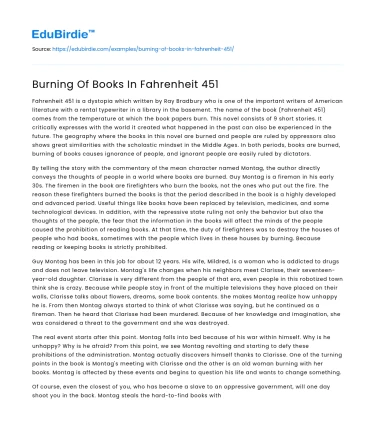Fahrenheit 451 is a dystopia which written by Ray Bradbury who is one of the important writers of American literature with a rental typewriter in a library in the basement. The name of the book (Fahrenheit 451) comes from the temperature at which the book papers burn. This novel consists of 9 short stories. It critically expresses with the world it created what happened in the past can also be experienced in the future. The geography where the books in this novel are burned and people are ruled by oppressors also shows great similarities with the scholastic mindset in the Middle Ages. In both periods, books are burned, burning of books causes ignorance of people, and ignorant people are easily ruled by dictators.
By telling the story with the commentary of the mean character named Montag, the author directly conveys the thoughts of people in a world where books are burned. Guy Montag is a fireman in his early 30s. The firemen in the book are firefighters who burn the books, not the ones who put out the fire. The reason these firefighters burned the books is that the period described in the book is a highly developed and advanced period. Useful things like books have been replaced by television, medicines, and some technological devices. In addition, with the repressive state ruling not only the behavior but also the thoughts of the people, the fear that the information in the books will affect the minds of the people caused the prohibition of reading books. At that time, the duty of firefighters was to destroy the houses of people who had books, sometimes with the people which lives in these houses by burning. Because reading or keeping books is strictly prohibited.
Save your time!
We can take care of your essay
- Proper editing and formatting
- Free revision, title page, and bibliography
- Flexible prices and money-back guarantee
Guy Montag has been in this job for about 12 years. His wife, Mildred, is a woman who is addicted to drugs and does not leave television. Montag's life changes when his neighbors meet Clarisse, their seventeen-year-old daughter. Clarisse is very different from the people of that era, even people in this robotized town think she is crazy. Because while people stay in front of the multiple televisions they have placed on their walls, Clarisse talks about flowers, dreams, some book contents. She makes Montag realize how unhappy he is. From then Montag always started to think of what Clarisse was saying, but he continued as a fireman. Then he heard that Clarisse had been murdered. Because of her knowledge and imagination, she was considered a threat to the government and she was destroyed.
The real event starts after this point. Montag falls into bed because of his war within himself. Why is he unhappy? Why is he afraid? From this point, we see Montag revolting and starting to defy these prohibitions of the administration. Montag actually discovers himself thanks to Clarisse. One of the turning points in the book is Montag's meeting with Clarisse and the other is an old woman burning with her books. Montag is affected by these events and begins to question his life and wants to change something.
Of course, even the closest of you, who has become a slave to an oppressive government, will one day shoot you in the back. Montag steals the hard-to-find books with great curiosity and is denounced by reading them and later declared a traitor.
At the end of the book, Montag talks to the old, knowledgeable men he met, one of them says that even though the books were burned and destroyed, the books they were reading are now hidden in their brains. In other words, the person who read and remembered Shakespeare's work is Shakespeare, while another is Byron because he knows Byron's poems. Thus, books are never actually destroyed.
Clarisse is the representative of the questioning, free consciousness. Firefighter Montag is the guardian of dystopian order. “Work, Montag, work,” said his supervisor. 'Promote, Montag,' said his wife. Montag worked; Montag would get promoted. But Clarisse asked: 'Did you know that firemen used to not burn books but put out fires?' Montag was surprised and questioned for the first time. He wondered.
In the book, we see how repressive management robotizes people. It shows how the media and technology, which have become the greatest tools of states today, brainwash people and direct them by frightening them. Does this sound familiar to you? In schools, only memorization was given and the habits of the order were nurtured. Have fun but don't think. Sounds familiar again, right? The people of Fahrenheit 451 are today's beings.
As technology develops, people become addicted to displays, as in Fahrenheit 451. We do not read and do not think. Let's think about our current life. Books are not burned, but we still do not read them. Isn't not reading the same as being burned? Won't they disappear unless they are read? We spend hours on things that won't make us think about our TVs and phones. We are too lazy to read even things that exceed two sentences that we correspond to. We don't care if there is a war outside. Because we think we're happy? So, what are we really happy about? Every day people are dying and being killed and nobody cares. Even young people use antidepressants. We are not even talking to each other. Am I different? Of course not. Clarissa made Guy realize somethings. Just like her, Fahrenheit 451 made me realize these. We must read while we are not dying by being poisoned by mechanical hound's needles, being crushed by the buzzing bugs cars, or burned by fire-spitting snakes yet.






 Stuck on your essay?
Stuck on your essay?

